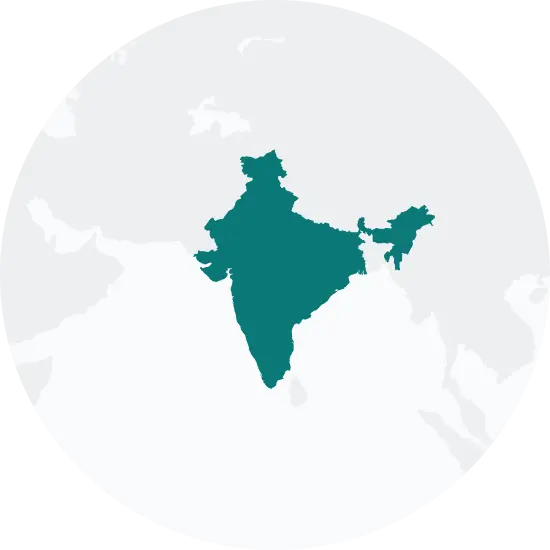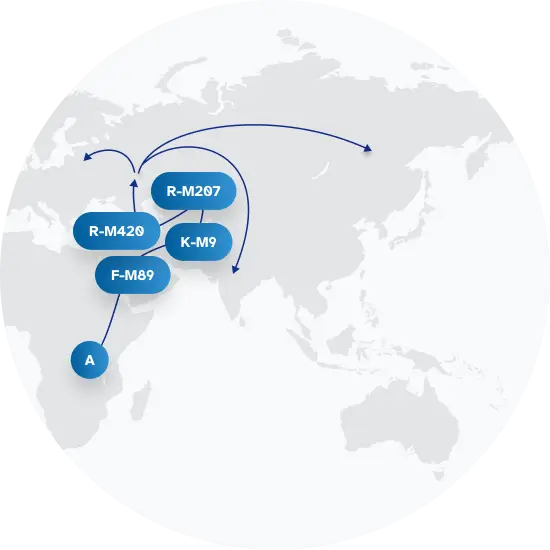Explore the Family Name Shah
How common is the last name Shah in the United States?
Based on the Decennial U.S. Census data, the surname Shah has significantly grown in popularity over a decade. In the year 2000, it was ranked 831st and had a count of 37,833, with a proportion per 100,000 of 14.02. By 2010, the surname rose to the 573rd rank while its count increased substantially by 54.06% to 58,287. This growth also reflected in the proportion per 100,000, which jumped by 40.94% to 19.76.
| 2000 | 2010 | Change | |
|---|---|---|---|
| Rank | #831 | #573 | 31.05% |
| Count | 37,833 | 58,287 | 54.06% |
| Proportion per 100k | 14.02 | 19.76 | 40.94% |
Race and Ethnicity of people with the last name Shah
In terms of ethnic identity, the data from the Decennial U.S. Census shows a majority of individuals with the Shah surname identifying as Asian/Pacific Islander. In 2000, this group accounted for 87.80% of all Shahs, and the number grew to 91.74% by 2010—an increase of 4.49%. The number of people identifying as having two or more races declined by 54.08% over the same period. Those identifying as White represented 4.05% of all Shahs in 2000, but this figure dropped by 11.36% to 3.59% in 2010. Similarly, the percentage of Shahs identifying as Hispanic and Black also decreased, by 21.35% and 17.54% respectively. However, there was an increase of 41.67% in those identifying as American Indian and Alaskan Native, though they still constitute a minimal proportion of the total.
| 2000 | 2010 | Change | |
|---|---|---|---|
| Asian/Pacific Islander | 87.8% | 91.74% | 4.49% |
| White | 4.05% | 3.59% | -11.36% |
| Two or More Races | 5.88% | 2.7% | -54.08% |
| Black | 1.14% | 0.94% | -17.54% |
| Hispanic | 0.89% | 0.7% | -21.35% |
| American Indian and Alaskan Native | 0.24% | 0.34% | 41.67% |
Shah ancestry composition
23andMe computes an ancestry breakdown for each customer. People may have ancestry from just one population or they may have ancestry from several populations. The most commonly-observed ancestry found in people with the surname Shah is Northern Indian & Pakistani, which comprises 76.1% of all ancestry found in people with the surname. The next two most common ancestries are Southern Indian & Sri Lankan (4.5%) and British & Irish (3.9%). Additional ancestries include Bengali & Northeast Indian, Gujarati Patidar, French & German, Central Asian, and Iranian, Caucasian & Mesopotamian.
Ready to learn more about your ancestry? Get the most comprehensive ancestry breakdown on the market by taking our DNA test. Shop 23andMe
| ANCESTRY BREAKDOWN | COMPOSITION |
|---|---|
| Northern Indian & Pakistani | 76.1% |
| Southern Indian & Sri Lankan | 4.5% |
| British & Irish | 3.9% |
| Other | 15.4% |

Possible origins of the surname Shah
Your DNA provides clues about where your recent ancestors may have lived. Having many distant relatives in the same location suggests that you may all share common ancestry there. Locations with many distant relatives can also be places where people have migrated recently, such as large cities. If a large number of individuals who share your surname have distant relatives in a specific area, it could indicate a connection between your surname and that location, stemming from either recent ancestral ties or migration.
Based on 23andMe data, people with last name Shah have recent ancestry locations spanning a few countries, mostly in India, and Pakistan.
| RECENT ANCESTRY Location | Percentage |
|---|---|
| Gujarat, India | 34.60% |
| Maharashtra, India | 32.90% |
| Rajasthan, India | 18.80% |
| Punjab, Pakistan | 17.30% |
| Punjab, India | 16.20% |
What Shah haplogroups can tell you
Haplogroups are genetic population groups that share a common ancestor on either your paternal or maternal line. These paternal and maternal haplogroups shed light on your genetic ancestry and help tell the story of your family.
The top paternal haplogroup of people with the surname Shah is R-Y7, which is predominantly found among people with Central & South Asian ancestry. Haplogroup R-Y7 is descended from haplogroup R-M420. Other common haplogroups include J-M241 and R-L295, which are predominantly found among people with European and Central & South Asian ancestry. Other surnames with similar common haplogroups are: Kumar, Mehta, Sharma, Rahman, Khan, Hussain, Singh, Ahmed, Ahmad, Mohammed.
The most common maternal haplogroups of people with Shah surname are: M5a, M30, U7. These most commonly trace back to individuals of Central & South Asian and European ancestry.
 Paternal Haplogroup Origins R-M420
Paternal Haplogroup Origins R-M420Your maternal lineage may be linked to Yu Hong
During the 6th century AD the Persian Empire controlled trade along the Silk Road through its Central Asian province of Sogdiana, providing a vital trade link between China and Europe. Evidence suggests there was a genetic connection as well. Researchers extracted DNA from the remains of a chieftain named Yu Hong, who was buried about 200 miles southwest of Beijing in 592 AD. His burial epitaph indicated that Yu Hong had Central Asian ancestry — and his DNA revealed an even more exotic background. Yu Hong's mitochondrial DNA belonged to the U5 haplogroup, a branch of U that is concentrated in Europe. This haplogroup assignment is a sure sign that he had European ancestors on his mother's side, and demonstrated the vast range of haplogroup U from the west to the east.

What do people with the surname Shah have in common?
Spoiler alert: it's complicated. People with the same last name are usually no more genetically similar than a randomly sampled group of people from the same population. That said, people with the same surname are more likely to have similar ancestries than randomly sampled individuals. The reason is the tendency of people with similar cultural or geographical backgrounds to preferentially mate with one another. That's why people who share a surname may be more likely to share traits and tendencies in common than people within the general population. Check out the percentages below to see the prevalences of tastes, habits, and traits of people with your surname compared with prevalences among 23andMe users.
Preferences
Traits
Habits
Wellness
Are health conditions linked to the last name Shah?
The short answer is that, if there is an association between surname and health, it's usually more about your ancestry than your name. Individuals with a given surname are no more genetically similar than the general population but often have similar ancestries. The populations of people associated with those shared ancestries often have sets of genetic variations, also known as alleles, in common. Some of those alleles are associated with a greater likelihood of developing certain diseases.
Disease variant frequency by ancestry
Disease allele frequencies in populations associated with the surname Shah are shown below. Important Note: not everyone with a disease allele will develop these health condition

























